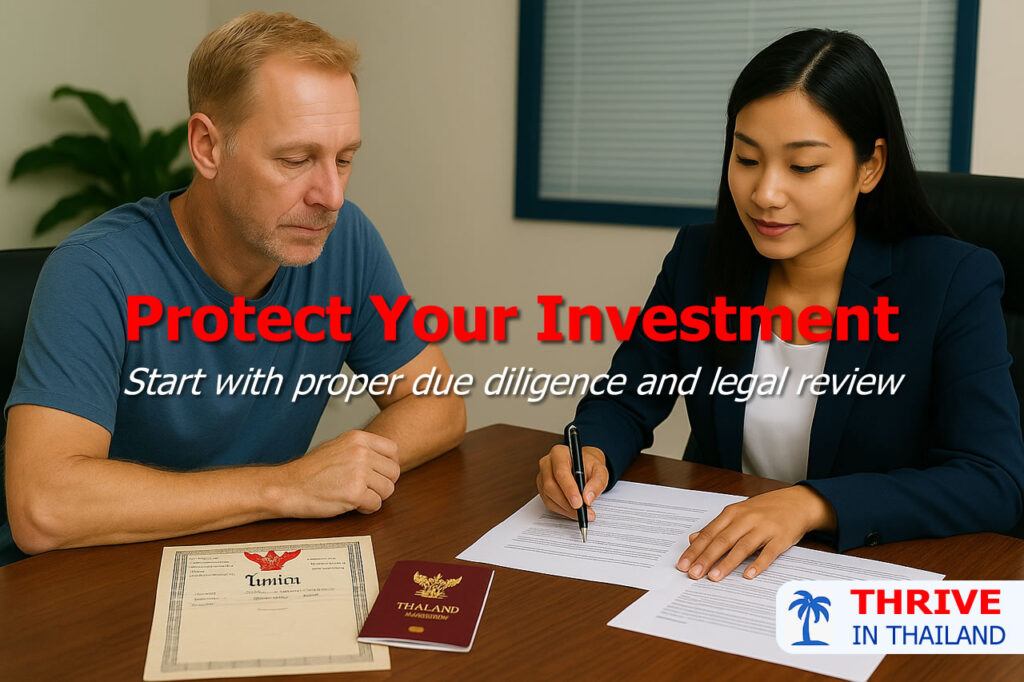
Thinking about buying property in Thailand as a foreigner? It’s entirely possible but there are legal limits you need to understand before you get started. While foreigners aren’t allowed to own land outright, there are fully legal ways to purchase condominiums and secure long-term control over houses or villas through lease agreements and other structured rights.
Thailand remains a top destination for expats and investors thanks to its affordable lifestyle, welcoming culture, and diverse property options. But the real estate laws are very different from what you might be used to, and a lack of due diligence can lead to costly mistakes.
In this guide, you’ll learn exactly what you can and can’t buy, how the property market works for foreigners, and the step-by-step process of making a safe, legal purchase. We’ll also cover common risks, key documents, and how to protect your investment—whether you’re buying for lifestyle, retirement, or long-term gain.
What Foreigners Can Buy in Thailand
Despite Thailand’s restrictions on foreign land ownership, there are several legal ways for foreigners to buy or control property. The most straightforward option is owning a condominium, but there are also legal structures that allow foreigners to control land or buildings over the long term. Below is a breakdown of what’s actually allowed.
Condominiums (Freehold Ownership)
Foreigners can legally own a condominium unit in Thailand under their own name, as long as the total foreign ownership within that building does not exceed 49% of the total sellable area. This is regulated under the Condominium Act and remains the most secure and hassle-free form of property ownership for non-Thais.
Key Requirements:
- The purchase must be made with foreign currency transferred into Thailand, documented through a Foreign Exchange Transaction Form (FETF).
- Ownership title must be properly registered at the Land Office.
- Only buildings registered under the Condominium Act qualify—this excludes apartment buildings and other multi-unit properties not formally registered as condos.
Ongoing Costs:
- Common Area Maintenance (CAM) Fees: Usually 30–80 THB per square meter per month.
- Sinking Fund: A one-time payment for long-term maintenance and upgrades, typically charged to the first buyer.
📌 Condos offer the easiest resale and rental options and are ideal for buyers seeking a low-maintenance lifestyle or a foothold in Thailand’s property market.

Buildings (Without Land Ownership)
Foreigners can legally own the structure (such as a house or villa) built on land they lease, even though they cannot own the land itself.
How it works:
- You lease the land (usually for 30 years) and obtain a construction permit in your own name before building.
- Ownership of the structure can be registered separately at the Land Office under the right to superficies.
📌 This arrangement is commonly used for private homes or villas and offers a degree of security, especially when paired with clear lease terms and proper legal documentation.
Leasehold Property (Land and/or House)
Foreigners are allowed to lease land or buildings for up to 30 years, with an optional renewal period (usually 30+30 years). While lease renewals are not automatically enforceable in court, including clear renewal clauses in the lease contract can help secure longer-term control.
Important Points:
- The lease should be registered at the Land Office to be legally enforceable.
- Lease terms can include rights to renew, transfer, or even sublet, depending on how the contract is structured.
- A lease is considered a right of use, not ownership—this distinction is critical when planning long-term investments.
📌 Leasehold structures are popular with retirees and long-term residents who want the benefits of living in a house without breaching Thai land laws.
What Foreigners Cannot Own in Thailand
While Thailand does offer legal avenues for foreigners to acquire property rights, it’s just as important to understand the limits. The country’s land ownership laws are strict, and violating them—knowingly or not—can lead to serious legal consequences, including loss of the property.
Here’s what foreigners cannot legally own under Thai law:
Land (in a Foreigner’s Name)
Foreigners are not allowed to own land in their personal name—this is one of the most fundamental restrictions under the Land Code Act of 1954. Whether it’s a plot in Bangkok or beachfront land on Koh Samui, outright ownership is off-limits unless specific exceptions apply.
Alternatives:
- Leasehold: Long-term land leases (typically 30 years) are permitted.
- Superficies or Usufruct: Rights that allow you to use or build on land owned by someone else.
- Thai Company Ownership: Legal if the company is real and operating—but risky if set up only to bypass land laws.
- LTR Visa Investment Path: Foreigners investing at least $500,000 (approx. 18M THB) in Thai assets—including real estate—may be eligible to buy land under very specific conditions, but this is rare and closely monitored.
Freehold Ownership of Landed Houses or Villas
Even if you build a house, you can’t own the land beneath it—and without a valid lease or superficies agreement, you have no long-term control. Some foreigners mistakenly believe they “own” the house because they paid for it, but under Thai law, land takes precedence unless ownership is clearly separated and registered.
Joint Land Ownership with a Thai Spouse
If you’re married to a Thai citizen, the land must still be registered solely in your spouse’s name. Thai law prohibits foreigners—even those legally married to Thais—from co-owning land.
To protect yourself:
- Consider signing a lease agreement, usufruct, or habitation right with your spouse.
- These agreements should be registered at the Land Office to be enforceable.
📌 Important: You may also be required to sign a declaration stating that the funds used to purchase the land belong solely to your Thai spouse, and that you waive any claim to ownership.
Land via Shell Companies (Nominee Shareholders)
Some foreigners attempt to bypass the law by forming a Thai company in which they hold a minority stake (usually 49%) and use Thai “nominees” to hold the remaining 51%. This practice is strictly illegal.
Thai authorities are increasingly scrutinizing property held under these structures. If found to be a sham—i.e., the Thai shareholders don’t have actual control—the Land Department can seize the land and impose fines or criminal charges.
📌 If you’re not running a real business with Thai partners, avoid this route entirely.
Legal Ownership Structures Explained
Although foreigners cannot directly own land in Thailand, there are several legal structures that can provide ownership of buildings or long-term control of property. Choosing the right structure depends on your goals—whether you’re buying a condo for personal use, building a home, or investing for the long term.
Here’s a breakdown of the most commonly used and legally recognized structures:
1. Freehold Ownership (Condos Only)
This is the most secure and straightforward option for foreigners.
- You can own a condominium unit outright in your own name.
- Foreign ownership within a building is capped at 49% of the total sellable area.
- The purchase must be funded with foreign currency sent from abroad, documented with a Foreign Exchange Transaction Form (FETF).
- Ownership is registered at the Land Office, and you receive a title deed (Chanote) for the unit.
Best for: Buyers seeking a low-maintenance, legally secure home or investment.
2. Leasehold (Land or House)
Foreigners can legally lease land or property for up to 30 years, with options to renew (often structured as 30+30 years).
- The lease should be registered at the Land Office—unregistered leases over 3 years are unenforceable.
- Contracts can include renewal, subletting, and inheritance clauses, though these are not guaranteed by law.
- You can build a house on leased land and own the structure (see “Superficies” below).
Best for: Long-term residents, retirees, or couples with a Thai spouse.
📌 Lease extensions are not automatic—each renewal depends on the landowner’s willingness or their heirs’ intentions.
3. Superficies (Right to Own a Building on Land)
A superficies agreement allows a foreigner to legally own a building on land they do not own.
- The landowner grants permission to build and own structures for a set period (typically 30 years or more).
- This right is registered at the Land Office and survives land sale or inheritance.
Best for: Foreigners who lease land but want to secure ownership of their home.
4. Usufruct (Right of Use and Enjoyment)
A usufruct gives a foreigner the legal right to use and benefit from land or property without owning it.
- Commonly granted for life or up to 30 years.
- Allows residence, rental income, and personal use—but not the right to sell or transfer.
- Must be registered at the Land Office to be enforceable.
Best for: Lifetime use of property—especially when married to a Thai spouse.
5. Thai Company Ownership (Caution Required)
A Thai Limited Company can own land—but only if it’s a real, operating business.
- The company must be majority Thai-owned (51% or more).
- Using nominee shareholders (fake Thai investors) is illegal.
- Foreigners can act as directors and hold minority shares, but not control the company through secret arrangements.
- Property becomes a company asset, not personal property.
Best for: Foreigners with legitimate Thai business operations.
📌 Avoid this method unless you’re actually running a compliant company.
Want a better understanding of the legal side of buying property as a foreigner? Read my full guide on Legal Property Ownership in Thailand for Foreigners to explore the ownership structures that are actually enforceable under Thai law.

Step-by-Step Guide to Buying Property in Thailand
Buying property in Thailand as a foreigner involves more than just finding the right place. It’s a legal process that requires due diligence, proper documentation, and compliance with Thai regulations. Here’s a clear, step-by-step breakdown to help you navigate the process confidently and avoid common pitfalls.
1. Research & Property Selection
Start by exploring the market—online platforms, local agencies, or word of mouth. Consider:
- Property type: Condo, house, or villa.
- Ownership method: Freehold (for condos), leasehold, or rights-based structures.
- Location & budget: Match your goals—retirement, investment, or long-term stay.
📌 Engage a reputable local real estate agent to help you navigate language, customs, and legal nuances. Good agents can save time and protect your interests—but don’t rely on them alone.
2. Engage a Property Lawyer
Before you sign anything, hire a qualified Thai lawyer specializing in real estate.
They will:
- Review all contracts and agreements.
- Conduct legal checks and due diligence.
- Represent your interests during the sale.
- Guide you through taxes, fees, and ownership rights.
📌 This step is not legally required but is strongly recommended for foreigners.
3. Conduct Due Diligence
A proper legal review protects you from hidden risks. Your lawyer should:
- Verify the title deed (Chanote preferred).
- Ensure the property is free of liens or encumbrances.
- Confirm proper zoning, building permits, and land use rights.
- Check lease terms (if applicable).
- Investigate any flood risks, coastal erosion, or boundary disputes.
📌 If you’re buying off-plan, verify the developer’s license, past project delivery, and registration status.

4. Make an Offer & Negotiate Terms
Once satisfied, make a formal offer—directly or through your agent.
Common negotiable terms include:
- Price and payment timeline.
- Included furniture or appliances.
- Conditions like “subject to title clearance” or “subject to legal review.”
5. Sign Reservation Agreement & Pay Deposit
Once terms are agreed:
- Sign a Reservation Agreement and pay a deposit (typically 10–30%).
- If not protected by clauses, the deposit is usually non-refundable.
- Include exit conditions like “subject to due diligence” to avoid financial loss.
📌 Important: Avoid unregistered agents or informal agreements. Insist on documentation and receipts.
6. Open Escrow (Optional but Limited in Thailand)
Escrow accounts hold the funds securely until the sale is finalized.
- In Thailand, escrow is only legal through licensed banks or financial institutions—not real estate agencies.
- Authorized banks include: Bangkok Bank, Kasikornbank, Siam Commercial Bank, Citibank, and others.
📌 While not always used in private sales, escrow is worth considering in high-value or off-plan transactions.
7. Transfer Funds from Abroad
To register foreign ownership of a condo:
- The full purchase amount must be transferred into Thailand in foreign currency.
- Your Thai bank must issue a Foreign Exchange Transaction Form (FETF) or equivalent confirmation. If you’re unsure how to transfer funds correctly, my guide to banking and financial tips for expats walks you through setting up accounts, international transfers, and avoiding costly mistakes.
- Name on the FETF must match the buyer.
📌 For other ownership structures (e.g. leasehold), foreign transfer is often still preferred to document capital inflow.
8. Sign Sales & Purchase Agreement (SPA)
This is the legally binding contract between buyer and seller.
Key elements to review:
- Payment schedule and deadlines.
- Penalties for delays.
- Responsibilities for taxes and fees.
- Warranty clauses (especially for off-plan or furnished units).
- Delivery conditions.
📌 Always review the final SPA in both Thai and English.
9. Pay Final Balance & Transfer Ownership
On the agreed date:
- The buyer, seller, and their lawyers meet at the Land Department.
- Buyer pays the final balance (usually via cashier’s check or bank transfer).
- Seller provides:
- Title deed
- Government ID
- Signed sale document
- The Land Office will:
- Verify documents
- Update ownership records
- Issue the new title or lease registration
10. Take Possession & Inspect the Property
After the transfer:
- Conduct a final walk-through to ensure the property is in agreed condition.
- Collect all keys, utility contracts, and documents.
- Register your name with the building’s juristic person (for condos).
- If leasing land, confirm lease and/or rights (superficies, usufruct) are properly recorded.
Taxes, Fees & Costs Involved
When buying property in Thailand as a foreigner, it’s essential to budget not only for the purchase price but also for the associated taxes, legal fees, and ongoing costs. These vary depending on whether you’re buying a condo, a leasehold, or property through a company structure.
Here’s a breakdown of the most common expenses:
1. One-Time Purchase Costs
| Item | Typical Rate | Who Pays |
|---|---|---|
| Transfer Fee | 2% of registered value | Often split 50/50 |
| Stamp Duty | 0.5% of registered value | If not subject to SBT |
| Specific Business Tax (SBT) | 3.3% (if sold within 5 years) | Seller (unless agreed otherwise) |
| Withholding Tax | 1% of appraised or declared value | Seller |
| Legal Fees | 10,000–30,000+ THB | Buyer |
| Escrow Fees (if used) | 0.25%–1% of sale price | Buyer or shared |
| Land Office Registration Fee | Approx. 1,000 THB | Buyer |
📌 Note: The “registered value” is usually lower than the market price. Taxes are typically calculated based on this official valuation by the Land Department.
2. Ongoing Costs for Condo Owners
| Type | Typical Rate | Notes |
|---|---|---|
| CAM Fee (Common Area Maintenance) | 30–80 THB per sqm/month | Charged monthly or annually |
| Sinking Fund | One-time payment (~500–1,000 THB/sqm) | Paid by first buyer for long-term upkeep |
| Utilities | Electricity, water, internet | Based on usage |
| Property Insurance | Optional but recommended | Especially for house or high-value condo |
Additional Notes
- Shared Tax Responsibility: In practice, some fees (like the transfer fee) are often split between buyer and seller. Always clarify this during negotiation.
- Lease Registration Fee: If buying leasehold property, lease registration at the Land Office costs 1.1% of the total lease value (often paid by the lessee).
- Company-Related Costs: If purchasing through a Thai company, there are additional accounting, tax filing, and annual license fees to consider.
Risks & Mistakes to Avoid
Buying property in Thailand can be rewarding—but it’s not without risks. Many foreigners, drawn by attractive prices and idyllic locations, jump into deals without fully understanding the legal or cultural landscape. Unfortunately, that can lead to disputes, financial loss, or even loss of ownership rights.
Here are the most common mistakes and how to avoid them:
1. Assuming You Can Own Land
Some foreigners believe they’ve found a “workaround” that allows them to own land—often through informal arrangements or nominee setups. The truth is: if you’re not a Thai citizen, you cannot own land in your own name, and attempts to circumvent this can lead to property forfeiture and legal penalties.
📌 Avoid: Illegal nominee structures or unregistered “verbal agreements.” Always follow the law and use legally recognized alternatives like leasehold, usufruct, or superficies.
2. Unregistered Lease Agreements
A lease longer than three years must be registered at the Land Office to be legally enforceable. If your 30-year lease isn’t registered, it won’t hold up in court, and the landowner could legally reclaim the property.
📌 Avoid: Trusting verbal promises or unregistered contracts. Insist on proper registration and keep a copy of the lease documents.
3. Skipping Due Diligence
Failing to check the title deed, zoning laws, access rights, or existing liens is one of the fastest ways to run into trouble.
📌 Avoid: Relying solely on the seller or agent’s word. Hire an independent lawyer to conduct a thorough title search and legal review.
4. Non-Refundable Deposits Without Conditions
Many foreigners pay a reservation deposit without adding basic protections—then lose it when problems arise.
📌 Avoid: Deposits without clauses like “subject to legal review” or “subject to clear title.” Get everything in writing, and confirm refund conditions before paying.
5. Signing Contracts You Don’t Understand
Contracts drafted by the seller are usually in Thai and may contain unfair terms. Some buyers sign them anyway, without realizing what they’ve agreed to.
📌 Avoid: Signing anything without a bilingual contract review by your lawyer. Clarify who is responsible for taxes, delays, and defects before committing.
6. Believing Escrow Is Standard in Thailand
In many countries, escrow accounts are a basic protection. In Thailand, they are only legal when operated by licensed banks, and not commonly used in private sales.
📌 Avoid: Trusting unlicensed escrow services offered by agents or lawyers. If you want escrow, make sure it’s through a registered financial institution.
7. Language & Cultural Barriers
Thai communication is often indirect. Misunderstandings can easily arise during negotiations or legal discussions, especially if no translator is present.
📌 Avoid: Overconfidence or assumptions. Be polite, ask questions, and insist on clear written agreements in both Thai and English.
8. Overestimating Rental Income or Resale Potential
While rental yields can be decent, they’re rarely spectacular—especially after factoring in fees, maintenance, and tax.
📌 Avoid: Treating a Thai property as a guaranteed investment. Buy primarily for lifestyle, with a realistic view of potential returns.
Expert Tips for Foreign Buyers
Buying property in Thailand as a foreigner can be smooth, secure, and worthwhile—if you go about it the right way. These expert tips will help you protect your investment, navigate legal grey areas, and avoid the costly mistakes that catch many newcomers off guard.
1. Always Use a Property Lawyer—Not Just an Agent
A real estate agent may help you find the property, but only a qualified Thai lawyer can protect your legal rights. Have your lawyer review all contracts, verify the title, and register any lease, ownership, or usage rights at the Land Office.
📌 Don’t skip this step, even for off-plan condos from reputable developers.
2. Insist on Bilingual Contracts
Contracts should be drafted in both Thai and English—and reviewed carefully. If any disputes arise, the Thai-language version usually takes legal precedence.
📌 Avoid signing anything you don’t fully understand—especially “boilerplate” forms pushed by sellers.
3. Register All Rights at the Land Office
Whether you’re leasing land, claiming superficies rights, or recording a usufruct, none of it is enforceable unless it’s registered. Unregistered agreements carry no legal weight in Thailand.
📌 No registration = no protection.
4. Get Everything in Writing—Always
Verbal promises mean very little. Whether it’s about lease renewal, furniture inclusions, completion dates, or payment terms—put it in the contract.
📌 If it’s not written down and signed, it doesn’t exist legally.
5. Avoid Unregistered or Informal Structures
Using a Thai spouse’s name without a lease, buying land through a fake company, or taking “shortcuts” might seem tempting—but they’re legally risky and offer no protection.
📌 If a setup seems too easy or too good to be true, it probably is.
6. Be Polite—but Firm—in Negotiations
In Thai culture, assertiveness is expected to be calm and respectful. Don’t rush, don’t confront, and don’t try to “win” aggressively—this approach often backfires.
📌 Use polite language, be patient, and maintain face-saving communication to achieve better outcomes.
7. Understand the Exit Strategy
If you plan to sell or lease out the property later, think ahead:
- Is it in a location attractive to other expats or Thais?
- Are foreign quota limits likely to affect resale?
- What are the local rental yields and demand?
📌 Don’t assume you’ll get your money back fast—think in years, not months.
8. Explore Visa Options Tied to Property
Property ownership doesn’t automatically grant you residency—but certain visa types, such as the LTR Visa, do consider real estate investment as part of the eligibility.
📌 If staying long-term, align your property strategy with your visa plan.
Related Articles & Resources
To help you explore the broader context of buying property in Thailand as a foreigner, here are some recommended reads and useful resources available on Thrive in Thailand:
Property & Legal Topics
- How to Rent a Condo or House in Thailand
Step-by-step guide for short and long-term rentals, including lease tips, deposits, and TM30 registration.
- Opening a Thai Bank Account as a Foreigner
Required for receiving FETF funds and managing utility or maintenance payments locally.
- Bank Loans for Foreigners in Thailand
What expats should know before applying—requirements, common rejections, and why having assets isn’t always enough.
- Thailand Work Permit & Starting a Business
Essential reading if you’re considering buying through a company or investing in commercial real estate.
- Thailand LTR Visa: Property Investment Path
Explore how real estate investment may contribute to Long-Term Resident visa eligibility.
Living in Thailand
- Pros and Cons of Living in Thailand as a Foreigner
Understand the full picture—beyond just property ownership.
- Cost of Living in Thailand
Plan your monthly budget realistically when owning a condo or home.
- Best Places to Live in Thailand
Even if you’re not buying, this guide helps you understand expat-friendly locations.

Final Thoughts
Buying property in Thailand as a foreigner is entirely possible—but it’s not something you should approach casually. The rules are clear in some areas and murky in others, and what might seem like a smart move today could become a legal headache down the line if you’re not properly informed.
That said, with the right legal support, realistic expectations, and a bit of patience, you can successfully navigate Thailand’s property market. Condos offer the safest route, especially for those looking for simplicity and full ownership. For those seeking houses or villas, leasehold structures and usage rights like superficies or usufruct can provide long-term control—as long as everything is properly registered.
The most common mistake? Rushing in without doing due diligence, or relying on vague verbal promises. Thailand rewards careful planning and respectful negotiation, so take your time, get everything in writing, and work with professionals who understand the local system.
If you’re thinking long-term, property ownership—done right—can be a great way to put down roots, gain stability, and enjoy all that Thailand has to offer. Just don’t go in blind. The more you know, the smoother the ride.
📌 Found this content helpful?
If this helped you understand the steps and pitfalls, a coffee keeps in-depth, no-nonsense property content free for everyone.
💬 Your questions might help other readers too! Feel free to share your thoughts or ask anything below.


Thanks Stephan, very useful information
Thanks for reading—I really appreciate your feedback! I aim to make these complex topics clearer for fellow expats. If you’re exploring property seriously, have a look at my guides on Legal Property Ownership in Thailand and Banking & Financial Tips for Expats—both tie directly into the buying process. And if you have specific questions about property types or the steps involved, feel free to ask—I’m here to help.